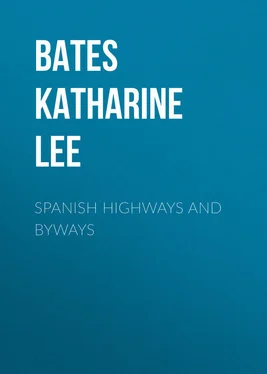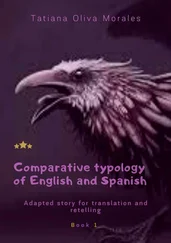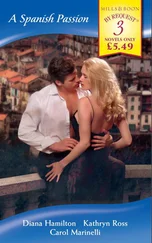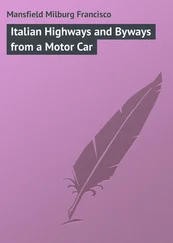Katharine Bates - Spanish Highways and Byways
Здесь есть возможность читать онлайн «Katharine Bates - Spanish Highways and Byways» — ознакомительный отрывок электронной книги совершенно бесплатно, а после прочтения отрывка купить полную версию. В некоторых случаях можно слушать аудио, скачать через торрент в формате fb2 и присутствует краткое содержание. ISBN: , Жанр: foreign_antique, foreign_prose, Путешествия и география, на английском языке. Описание произведения, (предисловие) а так же отзывы посетителей доступны на портале библиотеки ЛибКат.
- Название:Spanish Highways and Byways
- Автор:
- Жанр:
- Год:неизвестен
- ISBN:http://www.gutenberg.org/ebooks/38767
- Рейтинг книги:5 / 5. Голосов: 1
-
Избранное:Добавить в избранное
- Отзывы:
-
Ваша оценка:
- 100
- 1
- 2
- 3
- 4
- 5
Spanish Highways and Byways: краткое содержание, описание и аннотация
Предлагаем к чтению аннотацию, описание, краткое содержание или предисловие (зависит от того, что написал сам автор книги «Spanish Highways and Byways»). Если вы не нашли необходимую информацию о книге — напишите в комментариях, мы постараемся отыскать её.
Spanish Highways and Byways — читать онлайн ознакомительный отрывок
Ниже представлен текст книги, разбитый по страницам. Система сохранения места последней прочитанной страницы, позволяет с удобством читать онлайн бесплатно книгу «Spanish Highways and Byways», без необходимости каждый раз заново искать на чём Вы остановились. Поставьте закладку, и сможете в любой момент перейти на страницу, на которой закончили чтение.
Интервал:
Закладка:
One of their favorite games, for instance, is this: An especially active child, by preference a boy, takes the name of milano , or kite, and throws himself down in some convenient doorway, as if asleep. The others form in Indian file, the madre , or mother, at the head, and the smallest girl, Mariquilla, last in line. The file proceeds to sing: —
"We are going to the garden,
Although its wicked warden,
Hungry early and late,
Is crouching before the gate."
Then ensues a musical dialogue between the mother and Mariquilla: —
Mother. Little Mary in the rear!
Little Mary. What's your bidding, mother dear?
Mother. Tell me how the kite may thrive.
Little Mary [after cautiously sidling up to the doorway and inspecting the prone figure there].
He's half dead and half alive.
Then the file chants again: —
"We are going to the garden,
Although its wicked warden,
Hungry early and late,
Is crouching before the gate."
Mother. Little Mary in the rear!
Little Mary. What's your bidding, mother dear?
Mother. Of the kite I bid you speak.
Little Mary [after a second reconnoissance, which sends her scampering back to her own place].
He whets his claws and whets his beak.
Here the enemy advances, beating a most appalling tattoo: —
Kite. Pum, pum! Tat, tat!
Mother. Who is here and what is that?
Kite. 'Tis the kite.
Mother. What seeks the kite?
Kite. Human flesh! A bite, a bite!
Mother. You must catch before you dine.
Children, children, keep the line!
And with this the dauntless parent, abandoning song for action, darts with outspread arms in front of the robber, who bends all his energies to reaching and snatching away Little Mary. The entire line, keeping rank, curves and twists behind the leader, all intent on protecting that poor midget at the end. And when the wild frolic has resulted in her capture, and every child is panting with fatigue, they straightway resume their original positions and play it all over again. In Seville this game takes on a religious variation, the kite becoming the Devil, and the madre the angel Michael defending a troop of souls. In Cuba we have a hawk pitted against a hen with her brood of chickens.
We stepped into a Protestant Kindergarten one day to see how such stirring atoms of humanity might demean themselves in school. Talk of little pitchers! Here were some twoscore tiny jugs, bubbling full of mischief, with one bright, sympathetic girl of twenty-two keeping a finger on every dancing lid. Impossible, of course! But all her week's work looked to us impossible. We had known diligent teachers in the United States; this "lazy Spaniard," however, not only keeps her Kindergarten well in hand from nine to twelve, but instructs the same restless mites – so many of them as do not fall into a baby-sleep over their desks – in reading and counting from two to four, gives a Spanish lesson from six to seven, and struggles with the pathetic ignorance of grown men and women in the night school from eight to half-past nine or ten.
The Spanish pastor and his wife, also teachers in day school, night school, Sunday school, are no less marvels of industry. The multiplication table, lustily intoned to the tramp of marching feet, called us into a class-room where the older girls were gathered for lessons in reading and writing, arithmetic and geography, sewing and embroidery. The delicate little lady who presides over this lively kingdom may be seen on Sunday, seated at the melodeon, leading the chapel music – an exquisite picture of a Spanish señora, with the lace mantilla crowning the black hair and gracefully falling to the slender shoulders. We had heard her give an address on foreign soil, before an audience of a hundred strangers, speaking with an irresistible fervor of appeal, and no less charming was she at the head of her own table, the soul of vivacious and winsome hospitality.
As for the pastor himself, he carries the administrative burdens of church and school, teaches the larger boys morning and afternoon, and the men in the evening, preaches once on Thursday and twice on Sunday, and slips in between these stated tasks all the innumerable incidental duties of a missionary pastorate. And yet this man of many labors is not only Spanish, but Philippine. His childhood was passed at Cavite, the home of his father, a Spanish officer, who had chosen his bride from a native family. The boy was put to school with the friars at Manila, where, rather to the disgust of the soldier-father, he formed the desire to enter the brotherhood. He was not blind – what students are? – to the blemishes of his teachers. He had often stood by with the other lads and shouted with laughter to see a group of friars, their cassocks well girded up, drive a pig into their shallow pond and stab the plunging creature there, that it might be counted "fish" and serve them for dinner on Friday. But his faith in the order held firm, and, when his novitiate was well advanced, he was sent to Madrid for the final ceremonies. Here, by chance, he dropped into a Protestant service, and after several years of examination and indecision, chose the thorny road.
All his wearing occupations do not dull that fine sense of courtesy inherent in a Spanish gentleman. The sun itself had hardly risen when we departed from San Sebastian, yet we found Don Angel at the station, muffled in the inevitable Spanish capa , to say good-by once more and assure us that, come what might, we had always "a house and a friend in Spain." We laid down the local journal, hard reading that it was with its denunciations of "the inhuman barbarities of the North Americans toward the Filipinos," and ventured to ask for his own view of the matter.
"The United States," he answered, speaking modestly and very gently, "means well and has, in the main, done well. When I say this in the Casino, men get angry and call me a Yankee filibuster. But in truth the Philippines are very dear to me and I carry a sad heart. It was the protocol that did the mischief. It is not easy for simple islanders to understand that words may say one thing and mean another. Philippine faith in American promises is broken. And red is a hard color to wash out. Yet I still hope that, when the days of slaughter are over, peace and life may finally come to my unhappy birthplace from your great nation. The Tagalos are not so worthless as Americans seem to think, though the climate of the Philippines, like that of Andalusia, tempts to indolence. But strong motives make good workers everywhere."
II
A CONTINUOUS CARNIVAL
"This periodical explosion of freedom and folly." – Becquer: El Carnaval .
Having re-formed our concept of a Spaniard to admit the elements of natural vigor and determined diligence, we were surprised again to find this tragic nation, whose fresh grief and shame had almost deterred us from the indelicacy of intrusion, entering with eager zest into the wild fun of Carnival. Sorrow was still fresh for the eighty thousand dead in Cuba, the hapless prisoners in the Philippines, the wretched repatriados landed, cargo after cargo, at ports where some were suffered to perish in the streets. Every household had its tale of loss; yet, notwithstanding all the troubles of the time, Spain must keep her Carnival. "It is one of the saddest and most disheartening features of the situation," said a Spaniard to us. "There is no earnestness here, no realization of the national crisis. The politicians care for nothing but to enrich themselves, and the people, as you see, care for nothing but to divert themselves."
Читать дальшеИнтервал:
Закладка:
Похожие книги на «Spanish Highways and Byways»
Представляем Вашему вниманию похожие книги на «Spanish Highways and Byways» списком для выбора. Мы отобрали схожую по названию и смыслу литературу в надежде предоставить читателям больше вариантов отыскать новые, интересные, ещё непрочитанные произведения.
Обсуждение, отзывы о книге «Spanish Highways and Byways» и просто собственные мнения читателей. Оставьте ваши комментарии, напишите, что Вы думаете о произведении, его смысле или главных героях. Укажите что конкретно понравилось, а что нет, и почему Вы так считаете.












